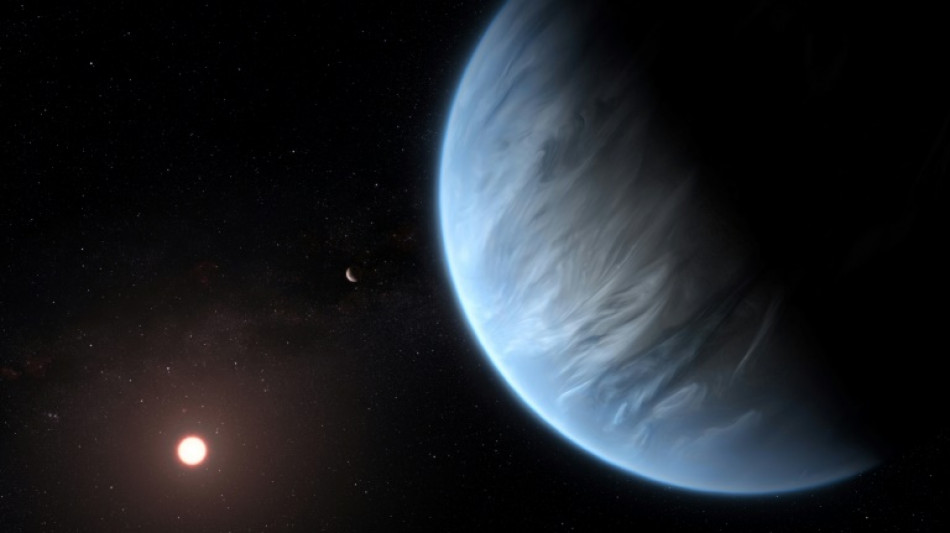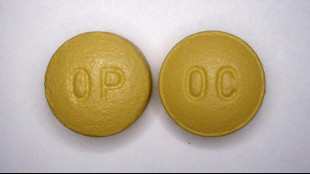
-
 England captain Itoje savours 'special' New Zealand win
England captain Itoje savours 'special' New Zealand win
-
Wales's Evans denies Japan historic win with last-gasp penalty

-
 Zelensky renews calls for more air defence after deadly strike on Kyiv
Zelensky renews calls for more air defence after deadly strike on Kyiv
-
NBA's struggling Pelicans sack coach Willie Green

-
 Petain tribute comments raise 'revisionist' storm in France
Petain tribute comments raise 'revisionist' storm in France
-
Spain on World Cup brink as Belgium also made to wait

-
 Spain virtually seal World Cup qualification in Georgia romp
Spain virtually seal World Cup qualification in Georgia romp
-
M23, DR Congo sign new peace roadmap in Doha

-
 Estevao, Casemiro on target for Brazil in Senegal win
Estevao, Casemiro on target for Brazil in Senegal win
-
Ford steers England to rare win over New Zealand

-
 Massive march in Brazil marks first big UN climate protest in years
Massive march in Brazil marks first big UN climate protest in years
-
Spain rescues hundreds of exotic animals from unlicensed shelter

-
 Huge fire sparked by explosions near Argentine capital 'contained'
Huge fire sparked by explosions near Argentine capital 'contained'
-
South Africa defy early red card to beat battling Italy

-
 Sinner beats De Minaur to reach ATP Finals title match
Sinner beats De Minaur to reach ATP Finals title match
-
Zelensky vows overhaul of Ukraine's scandal-hit energy firms

-
 South Africa defy early red card to beat Italy
South Africa defy early red card to beat Italy
-
Alex Marquez claims Valencia MotoGP sprint victory

-
 McIlroy shares lead with Race to Dubai title in sight
McIlroy shares lead with Race to Dubai title in sight
-
Climate protesters rally in Brazil at COP30 halfway mark

-
 Spike Lee gifts pope Knicks jersey as pontiff meets film stars
Spike Lee gifts pope Knicks jersey as pontiff meets film stars
-
BBC caught in crossfire of polarised political and media landscape

-
 'Happy' Shiffrin dominates in Levi slalom for 102nd World Cup win
'Happy' Shiffrin dominates in Levi slalom for 102nd World Cup win
-
Palestinian national team on 'mission' for peace in Spain visit

-
 Brazilian 'Superman' cheers child cancer patients in Ghana
Brazilian 'Superman' cheers child cancer patients in Ghana
-
India close in on win over South Africa after Jadeja heroics

-
 Huge explosions rock industrial area near Argentina's capital
Huge explosions rock industrial area near Argentina's capital
-
Bezzecchi takes pole for Valencia sprint and MotoGP

-
 Dominant Shiffrin leads after first slalom run in Levi
Dominant Shiffrin leads after first slalom run in Levi
-
Nine killed in accidental explosion at Indian Kashmir police station

-
 Climate protesters to rally at COP30's halfway mark
Climate protesters to rally at COP30's halfway mark
-
Fighting South Africa lose Rickelton after India 189 all out

-
 Harmer leads South Africa fightback as India 189 all out
Harmer leads South Africa fightback as India 189 all out
-
Prison looms for Brazil's Bolsonaro after court rejects his appeal

-
 EU bows to pressure on loosening AI, privacy rules
EU bows to pressure on loosening AI, privacy rules
-
India close in on lead despite South African strikes

-
 Curry's 49 points propel Warriors in 109-108 win over Spurs
Curry's 49 points propel Warriors in 109-108 win over Spurs
-
NZ boxer Parker denies taking banned substance after failed test

-
 Australia setback as Hazlewood ruled out of 1st Ashes Test
Australia setback as Hazlewood ruled out of 1st Ashes Test
-
Australia pace spearhead Josh Hazlewood ruled out of 1st Ashes Test

-
 UN Security Council to vote Monday on Trump Gaza plan
UN Security Council to vote Monday on Trump Gaza plan
-
Japan's Tomono leads after men's short program at Skate America

-
 China tells citizens to avoid Japan travel as Taiwan row grows
China tells citizens to avoid Japan travel as Taiwan row grows
-
Purdue Pharma to be dissolved as US judge says to approve bankruptcy

-
 Iran's first woman orchestra conductor inspires
Iran's first woman orchestra conductor inspires
-
Wood gets all-clear in boost for England

-
 Golf's world No. 8 Thomas has back surgery
Golf's world No. 8 Thomas has back surgery
-
Rebooted Harlem museum celebrates rise of Black art

-
 'Desperation in the air': immigrant comics skewer Trump crackdown
'Desperation in the air': immigrant comics skewer Trump crackdown
-
UN regulator says shipping still wants to decarbonize -- despite US threats


Doubt cast on claim of 'hints' of life on faraway planet
When astronomers announced last month they might have discovered the most promising hints of alien life yet on a distant planet, the rare good news raised hopes humanity could soon learn we are not alone in the universe.
But several recent studies looking into the same data have found that there is not enough evidence to support such lofty claims, with one scientist accusing the astronomers of "jumping the gun".
The debate revolves around the planet K2-18b, which is 124 light years away in the Leo constellation.
The planet is thought to be the right distance from its star to have liquid water, making it a prime suspect in the search for extraterrestrial life.
Last month, astronomers using the James Webb Space Telescope made headlines by announcing they had detected hints of the chemicals dimethyl sulfide (DMS) and dimethyl disulfide (DMDS) on the planet.
These chemicals are only produced by life such as marine algae on Earth, meaning they are considered potential "biosignatures" indicating life.
The astronomers, led by Cambridge University's Nikku Madhusudhan, expressed caution about the "hints" of a biosignature, emphasising they were not claiming a definitive discovery.
Their detection had reached a three-sigma level of statistical significance "which means there is still a three in 1,000 chance of this being a fluke," Madhusudhan said at the time.
- Biosignatures 'vanish' -
Two of Madhusudhan's former students, Luis Welbanks of Arizona State University and Matthew Nixon of Maryland University, were among the researchers who have since re-analysed the data behind the announcement.
When deploying other statistical models, "claims of a potential biosignature detection vanish", according to their preprint study published online late last month.
Like the other papers since the April announcement, it has not been peer-reviewed.
In one model, Welbanks and colleagues expanded the number of possible chemicals that could explain the signals detected by Webb to 90 from the original 20.
More than 50 received a "hit", Welbanks told AFP.
"When you detect everything, did you really detect anything?" he asked.
They are not saying the planet definitely does not have DMS -- just that more observations are needed, Welbanks added.
- 'Arguments are healthy' -
Madhusudhan welcomed the robust debate, saying that remaining open to all possibilities is an essential part of the scientific method.
"These sort of arguments are healthy," he told AFP.
His team even went further, releasing their own preprint study last week that expanded the number of chemicals even further to 650.
The three most "promising" chemicals they found included DMS but not DMDS -- a major part of the team's announcement in April.
The other two chemicals were diethyl sulfide and methyl acrylonitrile, the latter of which is toxic.
Madhusudhan admitted that these little-known chemicals are likely not "realistic molecules" for a planet like K2-18b.
Welbanks pointed out that "in the span of a month -- with no new data, with no new models, with no new laboratory data -- their entire analysis changed".
- 'Closest we have ever been' -
Telescopes observe such far-off exoplanets when they cross in front of their star, allowing astronomers to analyse how molecules block different wavelengths of light streaming through their atmosphere.
Earlier this week, a paper led by Rafael Luque at the University of Chicago combined Webb's observations of K2-18b in both the near-infrared and mid-infrared wavelengths of light.
It also found "no statistical significance for DMS or DMDS", the paper said.
An earlier paper by Oxford astrophysicist Jake Taylor using a basic statistical test also found no strong evidence for any biosignatures.
Madhusudhan dismissed the latter paper, saying the simple exercise did not account for observing physical phenomena.
He also stood by his research, saying he was "just as confident" in the work as he was a month ago.
More data about K2-18b will come in over the next year which should offer a much clearer picture, Madhusudhan added.
Even if the planet does have DMS, it is not a guarantee of life -- the chemical has been detected on a lifeless asteroid.
However, many researchers do believe that space telescopes could one day collect enough evidence to identify alien life from afar.
"We are the closest we have ever been" to such a moment, Welbanks said.
"But we have to use the frameworks that are in place and build up (evidence) in a reliable method, rather than using non-standard practices and jumping the gun -- as has been done in this particular case," Nixon added.
A.AbuSaada--SF-PST



